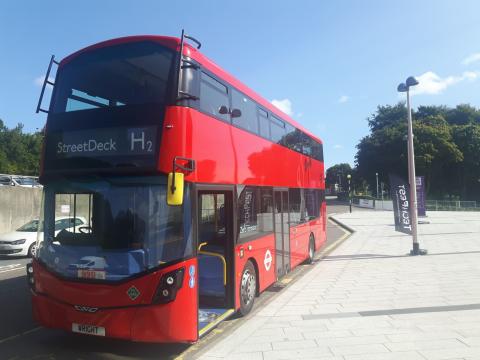Aberdeen is set to become the first city in the world to introduce hydrogen-powered double decker buses.
The new additions to the hydrogen fleet will underline the city’s role as a pioneer in green energy.
The contract which was signed this month will deliver 15 city buses. The project has been funded by Aberdeen City Council, European Union (FCH JU) and Scottish Government with an investment of about £500k per vehicle, building on the initial research funding contributed by the Scottish Cities Alliance.
The vehicles will be operated by First on the 19 (Culter to Tillydrone) route and is part funded by the European Union’s JIVE project, which aims to aid commercialisation of hydrogen buses through joint procurement between cities. Cities that will follow Aberdeen’s footsteps include London and Birmingham, with Dundee and Brighton and Hove being lead partners in JIVE2.
Launching later this year, the buses are more efficient than electric equivalents, with refuelling taking less than 10 minutes and offering a greater range. Water is the only emission from the vehicles, reducing carbon emissions and continues to contribute to the city’s commitment to tackling air pollution.
The buses have been produced by a UK-based company – Wrightbus based in Northern Ireland - and will complement the existing fleet that the city already boasts 10 buses as well as a range of vans and cars.
Councillor Philip Bell, Aberdeen City Council’s hydrogen spokesperson, said: “Aberdeen is pushing boundaries with an innovative approach when it comes to hydrogen, the entrepreneurial and technological leadership puts Aberdeen on the global map.
“Striving to tackle air pollution, these additional buses highlight Aberdeen City Council’s commitment and ambition as a centre for excellence for hydrogen and fuel cell technologies.”
David Phillips, Operations Director for First Aberdeen, said: “First Aberdeen are delighted to be the first bus company to operate these unique new Wrightbus hydrogen-powered double decker buses for the city of Aberdeen. It is a pleasure to continue our partnership with Aberdeen City Council on this innovative project and we applaud the council in its continued support of the hydrogen bus technology. We very much look forward to operating these new vehicles for the people of Aberdeen.”
FCH JU’s Executive Director, Bart Biebuyck, said: “Aberdeen is at the forefront of hydrogen mobility for public transport: it has been operating the first fleet of 10 fuel cells buses in Europe. With the addition of 15 new double decker buses, it also demonstrates the ease to scale up for zero emission mobility with hydrogen and is something for other European cities to follow.”
Scotland’s Energy Minister, Paul Wheelhouse, said: “The Scottish Government has supported a number of major projects which demonstrate the use of hydrogen. The First Minister has announced our commitment to undertake a detailed assessment on hydrogen and its potential to contribute to achieving our net-zero 2045 target. Our track record of early actions to fund hydrogen initiatives has created a favourable opinion of Scotland in the UK and abroad as an innovation leader in this area. We were delighted to contribute to the funding which has made this exciting next phase of Aberdeen’s hydrogen journey possible. This important investment will help the city achieve its decarbonisation ambitions and further cement its reputation for innovation and technology.”
David Barnett, Business Development Director for Wrightbus, said: “Wrightbus are delighted to have worked with Aberdeen City Council and First Aberdeen on this exciting project. The fuel cell electric bus range demonstrates yet again Wrightbus’ technical excellence and leadership. The vehicle offers pioneering cities, like Aberdeen, the opportunity to replace diesel buses with zero emission buses on a 1:1 basis”
Notes:
- This project has received funding from the Fuel Cells and Hydrogen 2 Joint Undertaking under grant agreement No 735582. This Joint Undertaking receives support from the European Union’s Horizon 2020 research and innovation programme, Hydrogen Europe Industry and Hydrogen Europe Research.
- About the FCH JU: The Fuel Cells and Hydrogen Joint Undertaking (FCH JU) is a unique public private partnership supporting research, technological development and demonstration (RTD) activities in fuel cell and hydrogen energy technologies in Europe. Its aim is to accelerate the market introduction of these technologies, realising their potential as an instrument in achieving a carbon-lean energy system. The three members of the FCH JU are the European Commission, fuel cell and hydrogen industries represented by Hydrogen Europe and the research community represented by the research grouping Hydrogen Europe Research.
- About JIVE: The JIVE (Joint Initiative for hydrogen Vehicles across Europe) project seeks to deploy 139 new zero-emission fuel cell buses and associated refuelling infrastructure across five countries. JIVE has received funding from the FCH JU (Fuel Cells and Hydrogen Joint Undertaking) under grant agreement No 735582. This Joint Undertaking receives support from the European Union's Horizon 2020 research and innovation programme, Hydrogen Europe Industry and Hydrogen Europe Research. This is the first out of two projects: The JIVE2 project started in January 2018. Combined, the JIVE projects will deploy nearly 300 fuel cell buses in 22 cities across Europe by the early 2020s. This is the most ambitious pan-European initiative to-date in commercialising hydrogen fuel cell electric buses and hydrogen refuelling infrastructure.
- About the Scottish Cities Alliance: The Scottish Cities Alliance is a unique collaboration of Scotland’s seven cities and the Scottish Government working together to deliver economic growth. With an investment prospective promoting the great potential across the seven city regions, the Alliance aims to attract external investment, stimulate economic activity and create new jobs and business opportunities. By working together Scotland’s cities can create projects of scale, as demonstrated within the hydrogen sector, and achieve an economically stronger future for Scotland.







